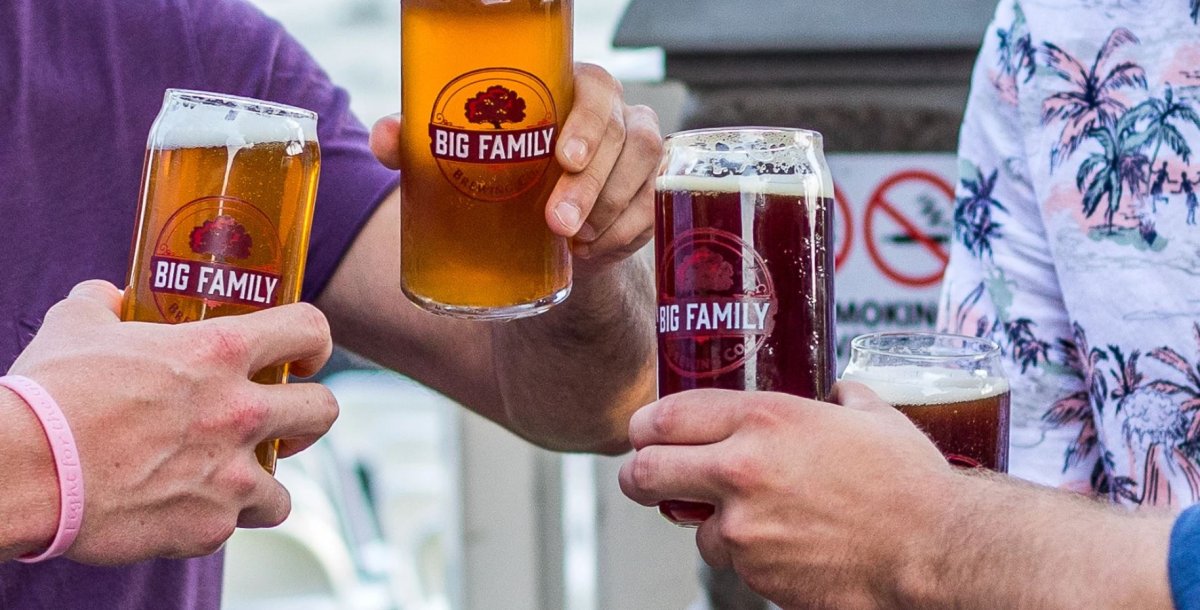While many retailers were scaling sales options back amid the novel coronavirus pandemic, a new brewing company out of Sarnia, Ont., was expanding.

Big Family Brewing Co. launched in early 2020. When a state of emergency was declared in March, the company decided to move ahead with what it had.
“I think right now it’s really important to do the best with what you have. I think that’s the way that we can really start up,” said operations manager Colleen Robb.
“What we had was a loading dock and a really beautiful location (on the waterfront).”
She says, in addition to online sales, the company opened up a small shop to sell its beer, before expanding over the summer.
“We were able to take over some of the restaurant space that was attached to us. We’ve since opened our beer garden (on Aug. 20), which is our outdoor area.”
Robb says some of the founders enjoyed the biergarten experience firsthand in Germany and wanted to bring that feeling and look to Sarnia, including live entertainment on Saturdays.
“When we’re thinking about a German biergarten, it really is that open space with long benches and tables and family of all ages and generations just getting together and sharing stories and laughing. Often there’s a lot of local food and entertainment.”
Some of Robb’s own inspiration comes from London, Ont., where she lived and worked for 12 years.

Get weekly health news
She specifically mentioned Forked River, Anderson Craft Ales, and London Brewing Co-op as sources of inspiration, and said that to succeed, even competing brewers need to support each other and their products.
“It’s a different kind of business,” she says. “We win together by supporting one another.”
There are four different craft breweries in Sarnia — Refined Fool, River Run, Imperial City, and Big Family — “and they’re all fantastic people and we’re all providing that fantastic product,” Robb says.
Robb says safety remains a priority. Big Family has added picnic tables on the grass outside so people can sit spaced apart.
“We’re looking into ways that we can also keep our resources open even past October, even if the weather gets chillier. It’s always a beautiful day on the waterfront,” she says.
“(The pandemic) has been really tough, but I think it is helping people find ways that we can still be together or at least expand our businesses or change the way that we do things just to kind of create a new normal, but to also stay positive and find ways that we can succeed.”
Robb says the company is looking into more provincial delivery options, but in the meantime, visitors can see their products, as well as ways to pick them up, on the company’s website.
The expansion at Big Family is a bright spot, as many small businesses in Canada have been facing reduced revenue, operational challenges, staffing issues, and increased costs, according to a survey from the Canadian Federation of Independent Business published Sept. 2.
The report found that, at the time, 64 per cent of respondents were fully open, 41 per cent were fully staffed, and only 28 per cent reported having normal sales.
When asked where they think their business would be after six months, 37 per cent of respondents said “scaled down operations with a plan to get back to normal,” while 25 per cent said “back to normal.”
Three per cent said closed down and nine per cent said they believe they’d have permanently scaled down operations, while six per cent believe they will be doing better than pre-pandemic.
Seven per cent said other and 13 per cent said “don’t know/unsure.”
The CFIB survey received a total of 3,752 responses from across Canada. For comparison purposes, a probability sample with the same number of respondents would have a margin of error of +/- 1.6 per cent, 19 times out of 20, the federation says.












Comments